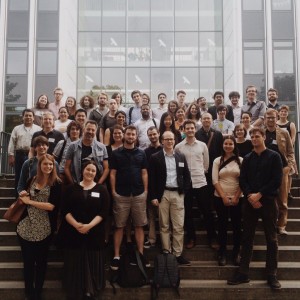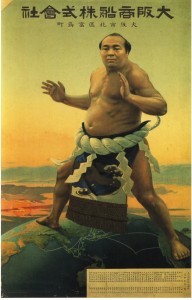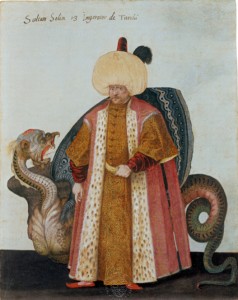Conference Report: Global History Student Conference (Freie Universität Berlin)
In recent years, global history has undoubtedly become part of our life as a dynamic historical perspective. Writing history without borders and addressing events with all their actors in an effort to maintain a view of the biggest picture possible, global history enjoys a distinct place among other historical disciplines. Reading the world through an individual or reaching a trans-national network from a local place are two important appeals of global history. Although it is a relatively recent sub-discipline, global history continues to make important contributions in the academic field thanks to the activities and intellectual energy of historians.
Last week, a group of students enrolled in the Global History MA program at Humboldt University Berlin and Free University Berlin hosted a "Global History Student Conference" in Berlin which, appropriately enough, brought together students from around the world. A great deal of effort went into the organization of the event on the part of the generous and welcoming host Alex Holmes and her colleagues Alex Leonzini, Cosima Hohental, Daria Tashkinova, Dennis Kölling, Elisabeth Köller, Maurice Boer, Oscar Broughton, Philipp Kandler, Thomas Lindner, Violet Dove, Willem van Geel, and Yorim Spoelder. The result of everything was a conference that provided students the opportunity to present and learn about wide variety of different perspectives in the field of global history.
The two-day conference consisted of ten panels and 39 presenters, all covering different themes. The goal of the conference was to answer the questions "How can we actually 'do global history' in practical terms?" and "How can global history complement but also challenge other disciplines; conversely, what critiques and new ideas can other disciplines bring to global history?" Here follows a short round-up of the conference summaries of some papers presented, plus a stirring keynote address delivered by historian Prof. Dr. Sebastian Conrad from Free University Berlin. Frequent readers of the Toynbee Prize Foundation's website may recall one of our previous interviews on his book "What is Global History?"
In his keynote address, Conrad offered guidance to students who are at the beginning of their careers, focusing on the features, promises, and challenges of global history. He focused on the recent explosion of new books and new journals on global history, but stated that while these developments might be exciting, it is still difficult to offer a clear answer to the questions of "What is global history?" or "What are the differences between global and world history?" Highlighting global history's features, Conrad explored how it connects the individual or local with the bigger, global picture. Another important point was the significant of "positionality" and the question "where we write the global history?" If a historian writes the history of colonial-India from London, it will be a different history than one written from New Delhi.
Moving on in his speech, Conrad addressed some obstacles and limitations of global history, including the problem of different "centrism" which can lead to "cultural fundamentalism" as well as the tendency to ignore immobile actors, while celebrating mobile actors like sailors or merchants. He concluded his speech with the final word on the "responsibility" of historians to not lose side of the local as they focus on the global.
Spurred by these remarks, the first group of panelists—Philipp Kandler (Freie Universität Berlin), Hayley Keon (University of Edinburgh), and Anna Warda (Universität Potsdam)— presented their papers dealing with the theme of "Decentralizing the Cold War," with Dennis Kölling serving as a moderator Kandler explored how Latin American dictatorships in the 1970s reacted to the human rights-based criticism of them, which threatened to isolate their state in the international area. He focused on the Argentine military dictatorship between 1976 and 1983 and the dictatorship of Anastasio Somoza in Nicaragua until 1979, analyzing the charges of society on their failure on universal human rights standards. He also described how these dictators, who were in the Western bloc during the Cold War, responded to the growing importance of human rights discourse in the WestKandler addressed the justifications used by dictators and their role at a global level on the international human rights framework.
Following this, Hayley Keon focused on the question of "to what extent did the relationship between African Tanzanians and South Asian diasporic communities in Dar es Salaam undermine the rhetoric of Afro-Asian unity in the years following Tanzanian independence?" The presentation went on to demonstrate the nature of the relationships between the Gujarati and African Tanzanian communities of Dar es Salaam during the practice of Ujamaa socialist policies under the regime of Julius Nyerere. Keon presented her topic, analyzing MG Vassanji's 2014 memoir And Home Was Kariakoo to display Gujarati-Tanzanian connections during the Cold War and the role of the Bandung Conference of 1955. The presentation linked the theoretical discourses of diaspora to the historical narratives of the Gujarati community of Dar es Salaam.
A second panel shifted the focus to "Global History Before 1750," with commentators Elisabeth Köller and Cosima Hohental and panelists Jasmin Kesetovic (Istanbul University), Robert Yee (Vanderbilt University), Aleksander Palikot (University of Edinburgh), and Michael Lee (Karl-Ruprechts-Universität Heidelberg). Lee contributed to the panel with his paper discussing European sources produced during the first encounters between Europe and Japan in the 16th and 17th centuries offer valuable information to understand Japanese culture that Japanese sources alone do not provide.
A third panel, composed of Katherine Arp (Leibniz Universität Hannover), Alexandra Leonzini (Freie Universität Berlin), and Sona Dilanyan (Sabancı University) under the chairmanship of Willem van Geel and Daria Tashkinova, focused on "Methodology and Marginalization" in the global context. Katherine presented her paper focusing on the question of "Are Social Sciences Serving Eurocentrism?" and Alexandra Leonzini further contributed to the panel with his presentation entitled "The Colonial Archive: A Technology of Rule." Finally, Sona concluded the panel with her paper on "Feminist Engagements with Historical Ruptures: Methodological Reflections," in which she analyzed archives and feminist movements in the global context.
The conference continued by highlighting different topics as "Global Urban History" by the fourth group of panelists: Ikbal Dursunoğlu (Boğaziçi University), Ksenia Litvinenko (National Research University–Higher School of Economics), Oscar Fernando Manrique Flórez (Universidad Antonio Nariño), and Wendy Qian (Georg-August-Universität Göttingen), under the chairmanship of Thomas Lindner and Philipp Kandler. Ikbal Dursunoğlu presented paper discussing the Great Fire of 1870 in Pera, Constantinople where most of the European embassies and some numbers of Jews and Muslims were situated. Its complete incineration down and later reconstruction became a subject of intense debate both within and outside the Ottoman Empire. Her study was based on European travelers' notes, maps drawn at the time, and foreign newspapers then published in Pera, with an emphasis on the archives of Levantine Herald, a daily bilingual newspaper in English and French. Another topic on architectural history in the global context was displayed by Ksenia Litvinenko from Russia. She presented the effect of the Second World War on architecture of Europe but also the ethnic, linguistic, and cultural composition of cities of Vyborg, Lviv, and Kaliningrad in the context of different political strategies of forgetting or commemoration.
The fifth panel addressed the theme of "Gender, Bodies & Power" by commentator Alex Holmes and Yorim Spoelder. James Worner (University of Technology Sydney) presented "Masculinity on Trial: Challenging Myths of Australian Masculinity through Experiences of Germans Interned at the Trial Bay Internment Camp, 1915-1918" and Ayşe Polat contributed the panel with her paper on "Contentious Politics of Sex and Space: Illicit Migration and Urban Governance in Fin de Siecle Istanbul." Kathy Burke (Humboldt Universität Berlin/Kings College London) explored global history through a paper titled "Bodies as Transnational Sites of Exchange: Interlocking Trajectories of Colonial Subjects in the French Empire of the Third Republic." Another panelist, Estefanía Montero, offered a paper titled "Calimbado: Brand, Body and Power in Novohispanic Societies in Oaxaca, Mexico."
Presenting on a panel focusing on "Transnational Ideologies and Networks," Alexander Korobeynikov spoke on Kazakh intellectuals' attempts to transform Kazakh society with new socio-political frameworks by taking advantage of the global trends of nationalism, self-government, and Enlightenment at the beginning of the 20th century. Korobeynikov placed his topic in a global context by focusing on "decolonization, nation building, education and other discourses that played a huge role in national outskirts of the Russian Empire" which was the same process of other national movements in many parts of the world. The sixth panel was continued by Liliia Boliachevets' presentation (National Research University–Higher School of Economics), which was related to the Bolshevik Revolution of 1917. She sought to situate its causes in the structural and political changes within the former Russian Empire, and the emigration of two millions of people who did not want to live under the Bolshevik order. In her presentation, Boliachevets showed how actors created new movement as Eurasianism in 1921, which represent a "Third Way" in state development including the advantages of both European liberalism and Soviet socialism. She located her paper in the global context by underlining the fact that other movements based on interwar ideologies, like fascism and the Pan-Asianism, developed in parallel with Eurasianism.
The presenters continued to explore their topics within the theme of "Memory Studies." Mu-Chien Chen (National Chengchi University Taipei) began his paper with the travels of Zhu Yuanzhang—an emperor who represented an example of dual identities (Chinese and Islamic)—as a case of the global production of historical memories. His study underlined the issues involved in studying historical memories, focusing on Chinese nationalists' narratives in the 19th and early 20th century and considering the question of whether they are Chinese-speaking Muslims (Hàn-Chinese) who practice Islam or are instead an independent ethnicity? His research investigates the global context of historical memories and quests for the identity of actors. Following upon Mu-Chien Chen's contribution, in her presentation Laura Neumann (Sabancı University) explored memory studies in the context of the slave trade by emphasizing the gaps in the slavery archives which companies recorded slaves' life as a commoditiy and Afro-diasporic memory through the novel of Saidiya Hartman, Lose Your Mother: A Journey Along the Atlantic Slave Route.
The theme of "Religion" was the subject of the eighth panel of the conference, which emphasized religious networks in the global context. Shaul Marmari (Hebrew University of Jerusalem) spoke on European and Ethiopian relations over material politics, collective emotions of Europeans' expectations to ally with Christians in Ethiopia to fight against Muslims, and their disappointment when they encountered the Jesuits who were active in the region. Marmari argued that over the years, Europeans have gained a certain image of Ethiopia as mythical power and religious piety, and that this image became an important figure in the political realm. He also addressed such questions as how Europe imagined Ethiopia, how the image of Ethiopia changed over time, and, most importantly, how this changing image shaped the attitude towards it from a religious point of view.
The "Post-Colonial" panel was another significant part of the conference. Arnab Dutta (Rijksuniversiteit Groningen/ Georg-August-Universität Göttingen) focused on European history through the eyes of some Bangla travelogues. He explored life in Europe through the lens of travelogues and their writing about urban Europe in a non-European language through the relationship between the colonial "masters" and the subjects. The panel continued with a presenter from Turkey, Joshua Shannon-Chastain (İstanbul Bilgi University). His paper discussed Anglo-Ottoman relations in the long 19th century, specifically focusing on British and Anglo-Indian officers who fought beside Ottoman troops for the defense of the Empire. They left behind numerous accounts, reports, articles, and documents providing information about the Ottoman military and political system.
The last panel addressed the topic of global art history. The presenters analyzed reflections of global history on art or visual materials which bear the trace of their own period enlightened today's world. Davide Ferri (Universität Basel/Humboldt Universität zu Berlin) analyzed the aesthetic features in the depiction of Ottoman sultans with exotic animals in Early Modern Florentine visual culture in the specific case of Jacopo Ligozzi's (1547–1627) art portraying Sultan Selim II (1524–1574) with a dragon. He underlined that this visual depiction also provides perceptions into the development of encyclopedic classifications of the monstrous in Early Modern natural history. Moving on, Jimena Mondragon (Universidad Nacional Autónoma de México) showed the global connections of travel postcards and steamship companies in the Japanese migration to the Americas in the late 19th century. Mondragon analyzed the Japanese travel postcards of companies which profited by of the transportations of Japanese workers in terms of materiality and the content.
After all the discussions on global history from different perspectives in the various panels, the conference was closed out with a roundtable final discussion covering the challenges of understanding and positionality in writing global history. The presenters also underlined the challenges of language involved in using archives in different countries. Roundtable discussion drew attention to the importance of respect towards indigenous voices and their place in the global context. They also focused on the significant challenge posed by Eurocentrism and other centrisms that overshadow the inter-connected, inter-related, and inter-depended nature of different parts of the world in history and today, and how they can be overcome by focusing larger geographical and temporal scales. Finally, the students arrived at a consensus to study wide a range of untouched topics in global history.


